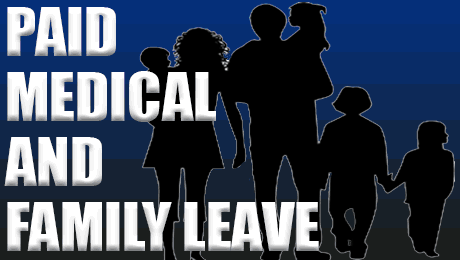While Congress passed legislation requiring temporary paid family and medical leave for those affected by the coronavirus, a new in-depth survey by the Program for Public Consultation at the University of Maryland (PPC) finds that two-thirds of Americans believe such paid leave should be permanent—fueled by a marked shift among Republican voters.
In March, Congress passed a law providing two weeks of paid leave for people dealing with COVID or caring for someone who does, and 12 weeks at 2/3 pay for parents caring for children home from closed schools and childcare facilities. The new benefits are set to expire at the end of 2020.
A March 11-25 survey conducted by the Program for Public Consultation (PPC) at the University of Maryland finds that 67% of voters favor a proposal in current legislation that would provide a system of paid family and medical leave that would be more expansive, would be supported by a new payroll tax, and would be permanent.
This support is up from 61% in an earlier wave of the survey – conducted March 5-10 – when the epidemic was in its early stage in the United States.
This increase is heavily driven by a surge in Republican support from 38% (March 5-10) to 48% (March 11-25). Support from Democrats rose from 83% to 86%.
Support is especially strong among younger Republicans, reaching 59% among those age 18 to 34 and 52% among those age 35-44. Support among Republicans 65 and older is lower at 38%, but this is up from just 25% in the March 5-10 period.
The proposal considered in the survey was based on the proposal in the FAMILY Act (H.R. 1185; S. 463) and in the PAID Leave Act (S.3513). It requires all employers to provide up to 12 weeks of leave in the event an employee needs to take time off to recover from a serious health condition, to care for a family member with a serious health condition, or to take care of a newly born or newly adopted child. Workers would receive two thirds of their wages up to a maximum of $4,000 a month, paid from a Federal government Trust Fund supported by a new payroll tax.
In the survey, respondents were told that the amount of the payroll tax would be 0.62% of employees’ salaries, covered evenly by the employer and the employee, as this is the amount that the Social Security Actuary concluded would be required. The legislation, though, calls for a slightly lower tax of 0.4%.
The survey, conducted by PPC, was released today by the nonpartisan organization Voice of the People, which provided support for the survey. The sample of 3,421 registered voters was provided by Nielsen Scarborough.
“This is strong evidence that the coronavirus may be changing politics. Americans, especially Republicans, are becoming more supportive of permanent paid leave for people with a serious health condition or who need to care for a family member,” commented Steven Kull, director of PPC.
The survey was unique in that respondents were given a briefing on the details of the proposed legislation, with background on the issue, and asked to evaluate a series of strongly-stated arguments for and against. All of the content was reviewed by proponents and opponents of the legislation to ensure that the briefing was accurate and balanced and that the arguments offered were the strongest ones being made.
Those who did not support the paid medical and family leave were asked whether they would favor requiring employers to provide such 12 weeks of leave, but without government-provided support covered by a new tax. This was favored by a near two to one margin. Combined with those who favored the legislation, total support for some type of required medical and family leave reached a near unanimous 87%. Among Republicans the total reached 79%, Democrats 95%.
This would effectively expand the reach of the Family and Medical Leave Act of 1993, which required some, but not all, employers to provide unpaid leave for medical and family reasons.
Another legislative proposal (based on H.R. 5296; S. 2976), which would provide tax credits to parents of newly born or adopted children—potentially enabling them to take leave—did not fare as well. The government would provide a $5,000 advance per child, which would then be effectively repaid by reducing the parents existing yearly child tax credit from $2,000 to $1,500 per child for 10 years. This proposal was framed as being either an alternative to the paid leave proposal, or a compliment to it. Views were evenly divided—50% in favor, 49% opposed—and did not change significantly from the March 5-10 period.
Though the proposed legislation has Republicans sponsorship, only 39% of Republicans favored the idea (60% were opposed). Support was higher among Democrats at 61%.
The survey was conducted online from March 5 through March 25 with a national probability-based sample of provided by Nielsen Scarborough from Nielsen Scarborough’s sample of respondents, who were recruited by mail and telephone using a random sample of households. The March 5-10 sample included 1,352 respondents with a margin of error of +/- 2.7%. The March 11-25 sample included 2,069 respondents with a margin of error of +/- 2.2%.
Questionnaire with Frequencies: http://www.publicconsultation.org/wp-content/uploads/2020/09/FML_Quaire_March2020.pdf
Try Policymaking Simulation: http://www.publicconsultation.org/family-and-medical-leave/

